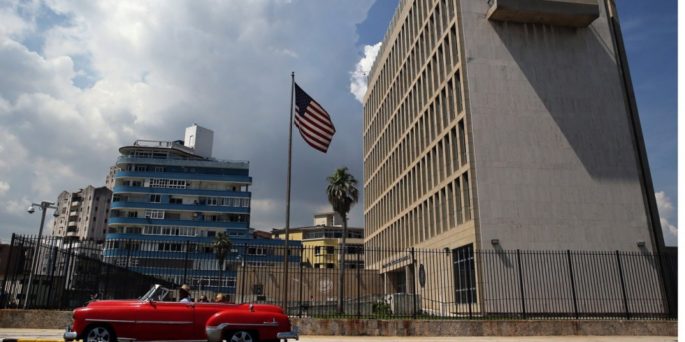
Anti-Cuban media overplay ‘acoustic attack’; Canada doesn’t assume a Cuban role
HAVANA — One of journalism’s characteristics is to follow up the news to provide greater information about a relevant subject. After the initial publication, successive articles about the subject provide the readers with new data and offer diverging points of view to give a more balanced and better developed presentation.
In recent days, however, several international media have tirelessly reproduced an article about a hypothetic and much-reported “acoustic attack” against diplomats at the U.S. Embassy in Havana, which allegedly also affected a Canadian diplomat.
Contrary to what in the U.S. is considered good journalism, what has happened in this case is the repetition of the same accusations against Cuba without adding nothing new in relation to the “attack.” Within a couple of days, an article published by The Washington Post has been reprinted by more than 15 other media outlets just in the United States.
It is not surprising that the Washington daily, which is well known for its aggressiveness toward Cuba, has twice published on the same day (Aug. 24) the same news — once as repeated information, what in journalism is known as “a rehash” (Sixteen Americans Suffered Injuries While Stationed at U.S. Embassy in Havana) — and an editorial, perhaps seeking greater credibility, whose only novelty is that it warns readers not to trust Cuba (Don’t Play Down a Sinister Attack on Diplomats in Cuba.)
This was done despite the fact that the Trump administration, after its absurd decision to expel two Cuban diplomats, declared that it cannot assure that Cuba bore no responsibility for the “attack.”
The Washington Post again repeats the reason for the expulsion: “Although the State Department has not accused the Cuban government of being directly responsible for harming Americans, it says Havana failed its obligations under the Vienna Convention to keep foreign diplomats safe.”
Under that forced interpretation of international commitments, Cuba could be held responsible for a promiscuous foreign diplomat contracting AIDS in Havana or suffering injuries (albeit slight) in a traffic accident.
The attack could have been easier to perpetrate because, according to The Post, “the incidents […] apparently happened, among other places, in the Cuban government housing provided to foreign diplomats.”
Can anybody believe that the embassies’ technical services don’t carry out what is known as electronic “sweeps” in search for possible monitoring devices planted by the host government before declaring the buildings fit for use by their personnel?
Perhaps this recent attempt to keep alive a news item that seems to be losing credibility led to the position of the Canadian government, reported on Aug. 25 by the Reuters news agency (Canada Says Not Assuming Cuba Was Behind Acoustic Incidents.)
According to Reuters, “From the Canadian perspective we would not assume automatically that this was necessarily intentional,” said an official in Ottawa, who said the Cubans had been ‘incredibly cooperative’ with the investigation.”
On the other hand, to underscore its position, the Canadian government told Reuters that it “has no plans to expel Cuban diplomats, an official said on Friday,” thus clearly distancing itself from the United States’ measure.
Mark Entwistle, the Canadian ambassador to Havana from 1993 to 1997, said that it is unsustainable to think that Cuba deliberately attacked the U.S. diplomats.
“It’s not even imaginable for me in the way I know the Cubans see the world,” he told Reuters in a phone interview.
The last word is not yet in. Presumably, at some future time, the three governments involved will state their conclusions. Meanwhile, let us recall all the anti-Cuban propaganda that constantly appears in the major international media, from presenting Che Guevara as a bloodthirsty murderer who enjoyed commanding execution squads, to the recent Miami campaign about changes made by Cuban Customs to the import rules for Cuban citizens, or to the alleged “news” that an airstrip at José Martí International Airport had sunk, forcing international flights to detour to Varadero.
Maybe the news of the “acoustic attacks” will eventually rival the one published some years ago by the Weekly World News, with a headline saying Cuba Launches Shark Attack Against U.S. next to a photograph of a dreadful white shark, jaws open, was the convincing subhead: “Castro’s evil plot to terrorize our beaches.”
The size of the lie does not matter; there will always be someone who believes it. And if repeated often enough, as is happening now with The Washington Post’s article, it will become the truth to many.

